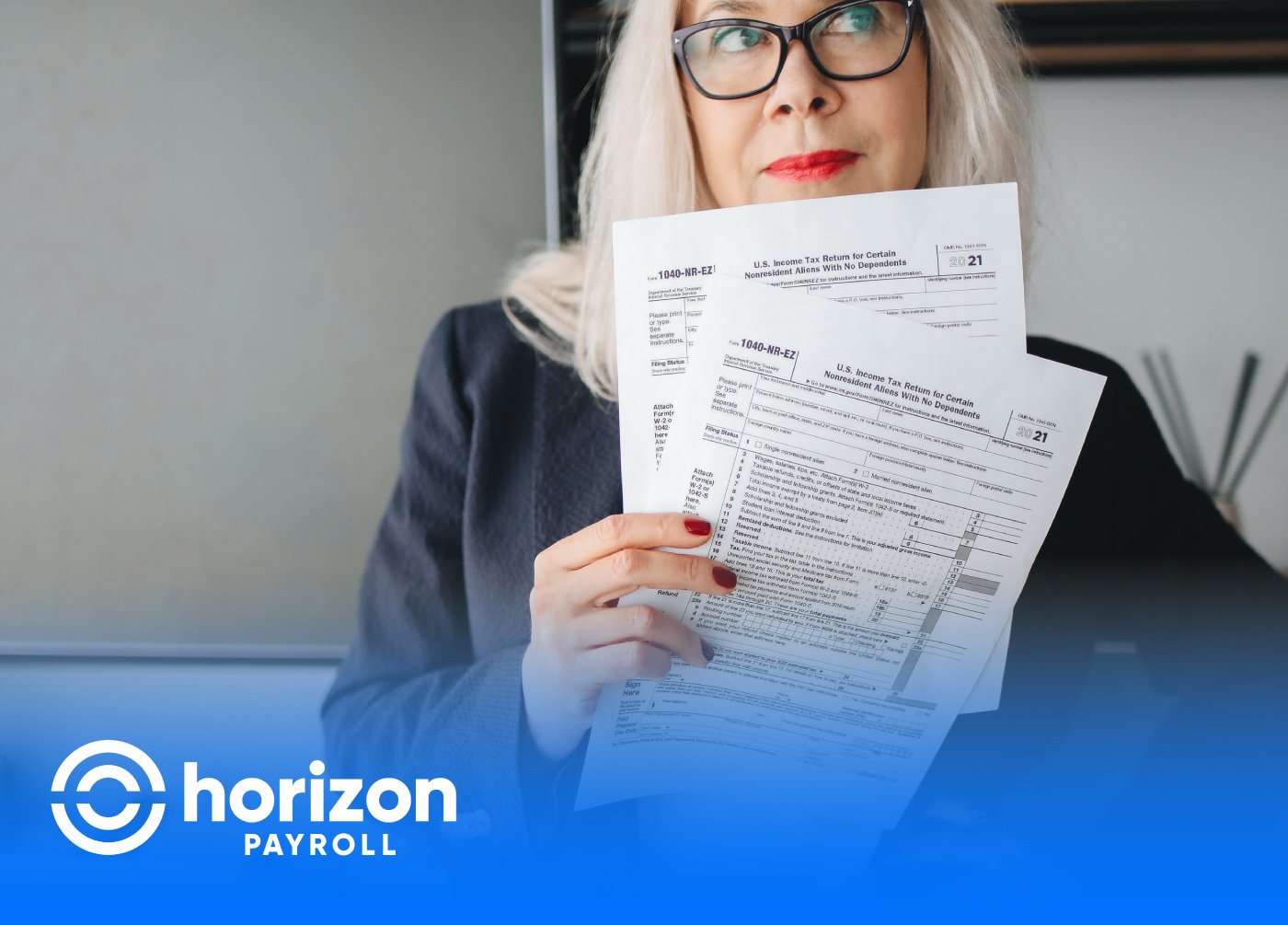5 min read
HR & Payroll Tips To Start Your Year Off Right (2025)
The start of a new year isn’t just about fresh resolutions and gym memberships. It’s also prime time to get your HR and payroll processes in order....
Expert payroll management services with a personal touch.
View Solution Read Guide HR Support
HR SupportSimplify and personalize HR with a team of HR experts on-demand.
View Solution Read Guide Time & Attendance
Time & AttendanceWhy spend more unnecessary time and money managing your workforce?
View Solution Read Guide Hiring & Onboarding
Hiring & OnboardingTurn your candidates into employees with hiring & onboarding solutions.
View Solution Read GuideAdd On Solutions automate everyday tasks, prevent mistakes, and simplify business compliance.
View SolutionHelpful downloads and eBooks to empower your business.
Helpful tax and HR alerts to help keep your business compliant.
Payroll and tax-related forms and documents.
Log in to your employer (admin) and employee portals.
Horizon's blog provides valuable insight into payroll, compliance, human resources, and more.
See our client success stories for a case study on how we can help your business.
Payroll and HR strategy requires intelligent technology, personal attention and specialized expertise in the needs and nuances of your business.
We provide payroll and tax processing services for businesses from 1 to 1,000 employees or more. Today, we have nearly 1,000 customers in 40 states.
4 min read
![]() Horizon Payroll Solutions
:
October 6, 2023 at 9:00 AM
Horizon Payroll Solutions
:
October 6, 2023 at 9:00 AM
In response to Congress’s 2022 passing of SECURE 2.0, states have begun requiring private businesses to provide employee retirement plans. Employers can opt into a state-sponsored program or find their own provider. More than 30 states have considered enacting state-mandated retirement plan legislation, and 17 states now have laws enabling state-sponsored retirement plans.
The SECURE 2.0 Act, enacted on December 29, 2022, introduces comprehensive modifications to 401(k) plans, especially those managed by small businesses. With aims to broaden coverage, amplify retirement savings, and streamline retirement plan regulations, the law has a lot to offer. All employers should familiarize themselves with these changes to guarantee their 401(k) plans align with the new requirements by the effective date.
The SECURE Act 2.0 has made sweeping changes to how employers will handle employee retirement savings. Below are some of the critical changes that you should understand as an employer.
Pooled Employer Plans (PEP): The act includes further clarifications and enhancements regarding Pooled Employer Plans (PEPs).
Automatic Enrollment Requirements: The bill encourages employers to automatically enroll their workers in company retirement plans, potentially increasing the default savings rate.
Required Minimum Distributions (RMDs): The age requirement to begin taking RMDs will increase from 72 to 73 in 2023 and age 75 in 2033.
Catch-up Contributions: As employees move closer to retirement age, they can contribute more to their retirement savings. Participants aged 50 and older can contribute an extra $7,500 annually to their 401(k) account. This amount will increase to $10,000 per year starting in 2025 for participants ages 60 to 63.
Long-Term Part-Time Employees: Starting in 2025, part-employees (those who worked between 500 and 999 hours) will be eligible to participate in their company's retirement plan after two years.
Saver's Match: Beginning in 2027, employees earning up to $71,000 per year will be eligible for a federal matching contribution of up to $2,000 per year that must be deposited into their retirement savings account.
Student Loan Matching: Beginning in 2024, the bill would allow employers to make matching contributions to a retirement plan based on an employee's student loan payments, thereby assisting those paying down student debt to save for retirement simultaneously.
Small Business Incentives: There are provisions to provide tax credits and incentives for small businesses to establish and maintain retirement plans.
In October 2023, Horizon hosted a webinar about the SECURE 2.0 Act to provide an overview of the upcoming changes and to help answer your questions. If you want to watch a screen recording of the recent webinar, contact Scott Langer via email at scottl@horizonpayroll.com.
The SECURE 2.0 Act makes sweeping changes that impact all employers, including auto-enrollment, part-time employee eligibility, incentives to participate, starter plans, and federal tax credits. These changes are intended to increase participation and contribution rates for employees, while also making it easier and more affordable for employers to set up plans and cover more of their workforce.
Before SECURE 2.0, employers with fewer than 100 employees were eligible for a tax credit of up to 50% of administrative costs within the first 3 years of starting their plans, with an annual limit of $5,000. SECURE 2.0 increases the credit from 50% to 100% for eligible employers with up to 50 employees. An additional credit of up to $1,000 per employee is available for eligible employers with up to 50 employees, but phases out from 51 to 100 employees.
Qualified employer plans that may claim the tax credit under section 4972(d) include 401(k) plans, SIMPLE plans, and simplified employee pensions (SEP).
Employers that set up a new plan can claim a credit of up to $1,000 per employee on employer contributions (for businesses with up to 50 employees; lower credits are available for businesses with 51-100 employees). The credit gradually phases out over 5 years. Employers with existing plans are not eligible for this particular credit.
SECURE 2.0 increases the startup credit from 50% to 100% for small employers. In the context of the retirement plans startup cost tax credit, a small business is capped at 50 employees.
In response to SECURE 2.0, states have begun rolling out legislation mandating private employers to offer retirement plans. Employers have the option to find a private provider or opt into the state-sponsored plan, which typically offer IRAs only. 17 states now have laws enabling state-sponsored plans, and over 30 states have considered state-mandated retirement plan legislation.
SECURE 2.0 contains almost 100 changes to retirement savings plans, from Required Minimum Distributions to student loan payments to automatic escalation and more. This act demonstrates that the legal tailwinds are pushing all employers to offer retirement plans.
Whether you're interested in a traditional 401(k), or a pooled employee retirement plan, we have the expertise to guide you through the process! At Horizon, our team of experts is here to assist you every step of the way. We'll explain the benefits of each option, help you make an informed decision, and assist with plan implementation and administration.
If you're ready to take the next step in enhancing your employee benefits package with a retirement plan, don't hesitate to reach out to Horizon today. Contact us for a consultation, and let us show you how we can help you attract and retain top talent while simplifying your benefits administration.

5 min read
The start of a new year isn’t just about fresh resolutions and gym memberships. It’s also prime time to get your HR and payroll processes in order....

7 min read
Small business owners are constantly seeking ways to minimize their tax liabilities and increase their bottom line. One strategy that can help...

8 min read
Navigating the tumultuous seas of HR compliance has always been challenging, but 2024 is sure to present a particularly new and complex set of...